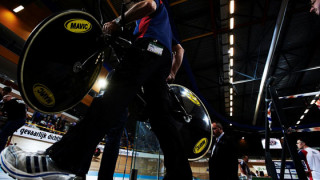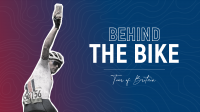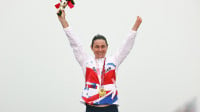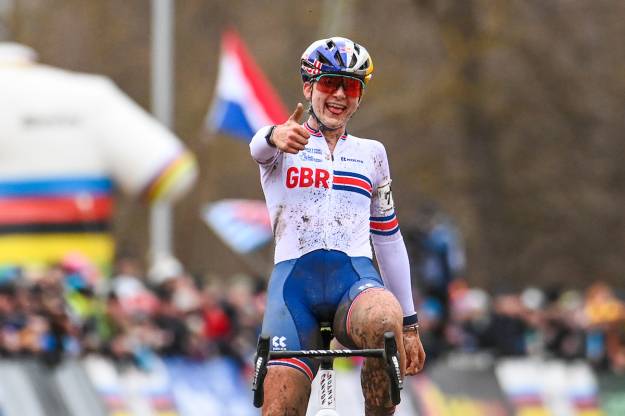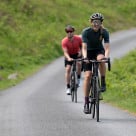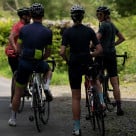Published: 6 July 2012![]()
Words: Simon Powers
We are all familiar with many of the riders and coaches responsible for the great performances of the Great Britain Cycling Team. But in the lead up to this summer’s Olympic Games, we’re taking the opportunity to have a look at some of the staff who support the Great Britain Cycling team who tend to go unnoticed but without whom, the team couldn’t functional optimally.
Jo Harrison from the English Institute of Sport has been working full time in the role of Performance Lifestyle Advisor to British Cycling’s Olympic and Paralympic programmes since 2005. Jo is one of around 20 such advisors who work in support of World Class funded athletes across a range of sports, delivering the Performance Lifestyle Service which is ‘core-funded’ by UK Sport. The service is seen as an entitlement to athletes on world class funding so this is why it is classed as ‘core-funded’.
NO STONE UNTURNED
The role follows the ‘no stone unturned philosophy’ with regards to sport performance. This means considering the individual as well as the numbers and data that they produce on a bike or in the gym.
Jo explains “In order to fulfil the no compromise approach in British Cycling we have to also look beyond the numbers in supporting the individual athlete, the person behind the performance – that’s where Performance Lifestyle comes in. I’m concerned with supporting the individual riders in their off-the-bike life, in areas such as personal development, planning and organisation, managing their finances and maintaining important relationships.”
The service is about helping athletes manage their lives well so it doesn’t have a negative impact on their performance.
LIFE AFTER CYCLING
Performance Lifestyle is also concerned with helping athletes to create a future pathway for themselves so that they can continue in their sport for as long as possible, safe in the knowledge that there are options and opportunities waiting for them when they are ready.
As Jo explains: “Unfortunately not all athletes will be able to have comfortable lifestyles and exciting future careers off the back of their athlete profiles or reputations. Therefore in order to sustain a standard of living they will have to seek future employment and due to the amount of time they have dedicated to their sport they are in a very different position to their peers in terms of the world or work. Having said that our riders have a huge amount to offer to potential employers and it’s a big part of my role to help the riders, when they are ready, to start to work out what they want to do and approach employees or look at suitable training options.”
Leading in to the Olympics, a fundamental part of Jo’s role is to reduce and manage what she describes as “noise”, namely all the distractions that a rider has off the bike. This involves supporting the riders in finding their optimal living environment, ensuring that all the business and tax matters for the riders are in order and generally helping the riders in planning and organising themselves efficiently.
INCREASED DEMAND
Since the Olympic Games in Beijing there has been a remarkable rise in the profile of the sport of cycling. As a result, Great Britain riders now deal with increasing amounts of commercial and media interest and Jo supports the riders individually in how they go about managing this. Jo focuses on the formulation of working relationships with agents and management companies right from the start to ensure that a performance focus is preserved for each individual athlete.
“This year, in particular, has been about identifying and removing or managing potential lifestyle distractions such as media and commercial demands, the appropriate set up of working relationships with agents and providing support around the management of riders’ own friends and family”.
HOME GAMES
The fact that the 2012 Games are on “home” soil will bring different challenges to those the riders have experienced before. Their own friends and family are likely to be more involved this time and the access to the athletes will be easier than in Beijing, for example. Therefore it’s important to work with the riders and families to manage this appropriately. In their preparation for 2012 the British Olympic Association conducted some research with past home Olympians who cited the distraction of their own friends and family as one of their biggest stresses during their competition. In an attempt to counter this, Jo has asked each rider to nominate one key ‘friends and family’ contact who has the responsibility of liaising with her and then communicating with the wider support group – thereby releasing the athlete from the added pressure of having to do this.
Jo summarised: “If I can reduce the unintentional distraction of riders’ own friends and family and help to ensure that they have a good Games experience too, that will be my contribution to the performances at the Games and I’ll be very happy with that”.

